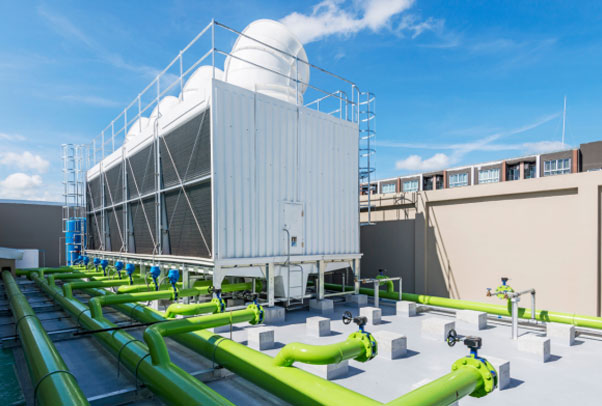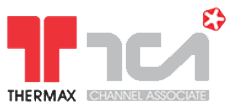
Cooling & Chiller Water Treatment Chemicals
- Initial conditioning
- Anti Scalant and antifoulant
- Corrosion control
- Biocides to control Algae and bacteria
Cooling Water Treatment
Despite the importance of properly functioning cooling tower systems, operational control of cooling water treatment programs frequently is neglected and thus is the single most common cause of program failure. The best combination of corrosion, scale, and deposit control chemicals with effective biocides, is completely worthless if not consistently and correctly applied to the cooling water.
Cooling water chemistry control begins with cooling water cycles or the number of times the dissolved salts in the fresh makeup water are concentrated by evaporation from the cooling system. This parameter is commonly obtained by measuring the conductivity of the cooling water and dividing it by the measured conductivity of the makeup water. Cycles also can be calculated using other parameters such as chlorides and dissolved solids. They are common to both the makeup and cooling water and are not expected to be affected greatly by chemical additions, precipitations, makeup water, and blowdown water volumes.
Control of cycles is critical in systems using non-softened makeup water. No chemical treatment program can cope with excessive hardness salts in cooling water resulting from very high cycles of concentration. Excessive hardness salts in cooling water increase the potential for scale formation. Cycles are controlled by discharging, or blowing down, concentrated water from the system and replacing it with fresh water. Blowdown, as this discharge is called, lowers the system concentration of dissolved solids.
One may ask: "Why use chemical treatments to operate at additional cycles when no scale often forms when operating at lower cycles?" The best answer is that operation at increased cycles substantially lowers the makeup and blowdown requirements, cutting the cost of fresh water and sewage disposal. Increasing the cycles so that the water is rendered less corrosive with corrosive waters is an inexpensive means to improve corrosion control. Another point is that operation at increased cycles permits effective corrosion inhibitors that may be too costly to employ at the higher blowdown rates resulting from the low-cycle operation.
Occasionally, the makeup water quality is so bad that a scale inhibitor must be employed to use the water. In such cases, cycling reduces the cost of the scale inhibitor to an economic level.
Chilled Water Treatment
Suppose the chilled water system contains mild steel, copper alloys, aluminum, or galvanized steel and uses makeup water that contains minerals and microbes. In that case, water treatment is necessary if you want to protect your system for many years. Also, you must constantly maintain the water treatment and monitor the results for corrosion, deposits, and microbiological control to ensure that protection continues. Thermax's range of water treatment products will provide solutions to all these problems.

